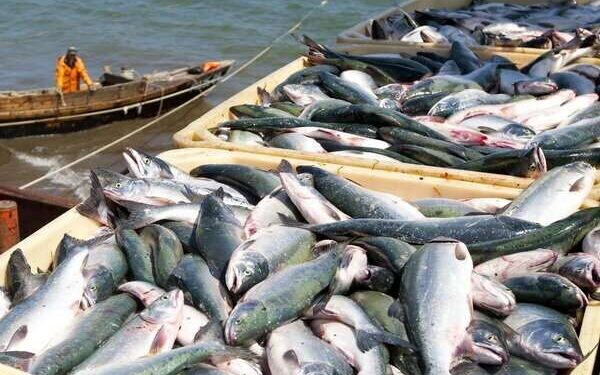Minister for Fisheries and Aquaculture Development and Member of Parliament for Shama, Emelia Arthur, has revealed while aquaculture holds significant promise for youth employment and food security, challenges particularly around fish feed must be addressed for the sector to thrive.
Speaking at the Government Accountability Series in Accra on Monday, August 6, 2025, Hon. Arthur acknowledged that her constituency has several large water-filled pits created by years of clay and quarry mining, which experts say could be viable for aquaculture.
“The aquaculture subsector has tremendous potential and benefits, but it is not an easy place. One of the major concerns in the aquaculture sector is feed. We are currently exploring other alternatives,” she stated.
“Experts have checked and confirmed that it is possible to use these old mining pits for fish farming. The question now is how we support the youth whether we build cooperatives or youth groups—and help them enter the business meaningfully,” she explained.
However, she cautioned that government support must go beyond one-time assistance to ensure sustainability.
“We must be careful not to give one-off support, only for them to struggle later because fish feed is expensive or unavailable. At the Ministry of Fisheries, we are meticulous. We dot our I’s and cross our T’s before launching new initiatives. Maybe in six months, I can speak more concretely to this.”
On fisheries management, Hon. Arthur highlighted ongoing efforts to reform the closed season, a policy measure meant to allow fish stocks to replenish.
She said government is working to modify the approach, especially for artisanal fishers, following consultations with scientists and civil society organizations. These changes aim to ease the economic burden fishing communities face during the month-long pause in activities.
“During the July closed season, poverty is visible in our fishing communities. National interventions like rice, oil, and tomato supplies do not adequately reach all fishermen. We are talking about 14,000 canoes, and each supports close to 100 fishers. What we give doesn’t go far.”
She further noted that lack of enforcement during the closed season often backfires, expressing that “When there is no enforcement and illegal fishing continues unchecked, the gains made during the one-month closure are lost within a week of reopening. That is why we’ve adopted a modified approach this year.”
To support traditional fishery management practices, she revealed that the ministry is also collaborating with chief fishermen and local assemblies to legally enforce the Tuesday no-fishing rule, a cultural conservation practice in many coastal communities.
“We’ve worked with the Ministry of Local Government and MMDCEs to make Tuesday no-fishing days a legal requirement through district bylaws. The traditional authority may have lost some power, but this legal backing reinforces their role.”
She added that President John Dramani Mahama has appointed a Presidential Aide to advise the ministry on indigenous knowledge and traditional practices, emphasizing the value of home-grown fisheries management systems.
Read Also: Galamsey, Poor Prices Threaten Future of Cocoa – Political Scientist

























